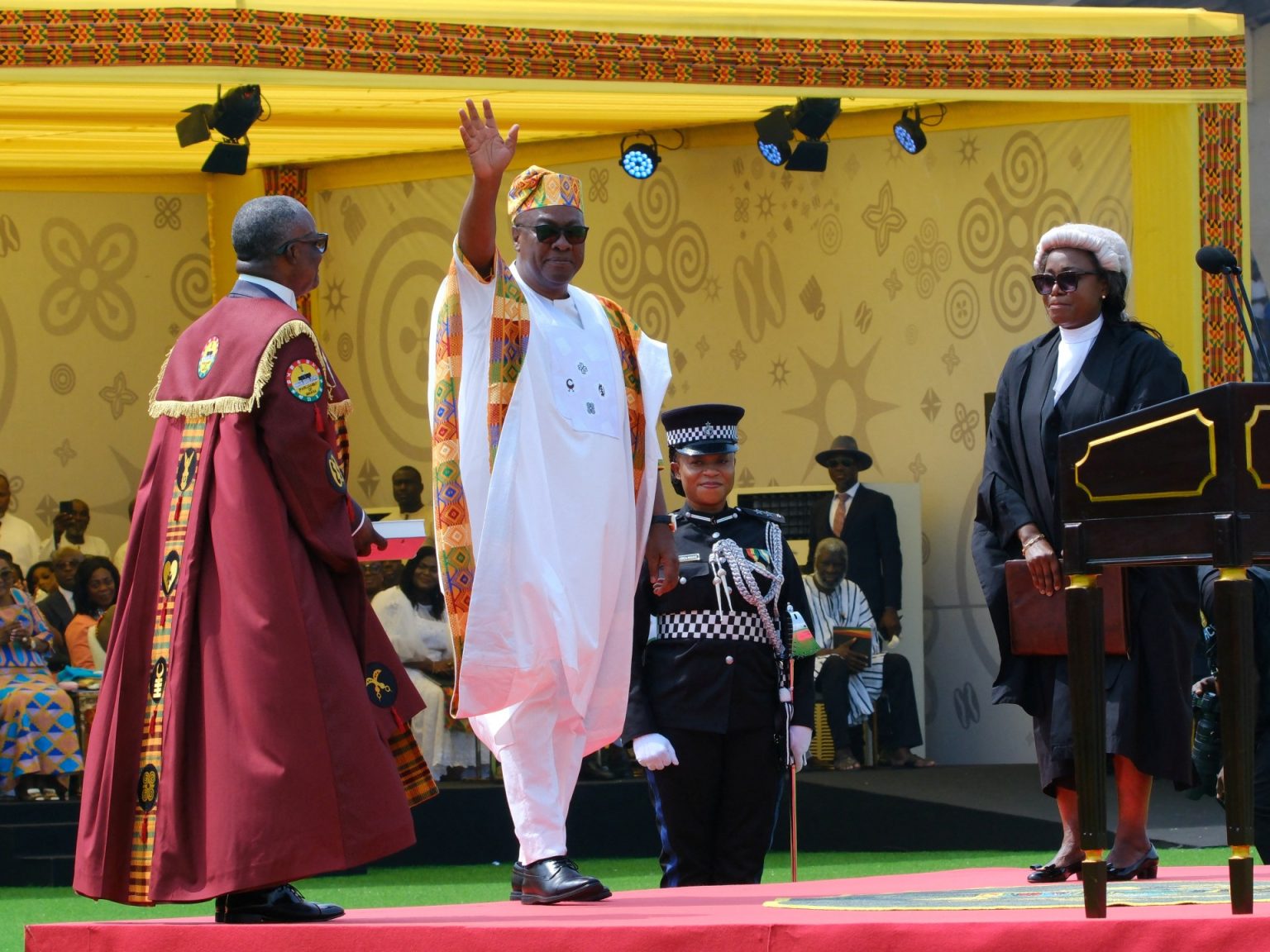Paragraph 1: A New Dawn for Ghana
John Dramani Mahama, a seasoned politician and former president, has been sworn in for a second term as Ghana’s president, marking a significant turning point in the nation’s political landscape. The inauguration ceremony, held at the iconic Black Star Square in Accra, was a vibrant spectacle of national pride and hope, attended by approximately 20 African leaders, signifying the importance of this transition for the region. Mahama’s victory, securing 56% of the vote in the December 9th election, represents a shift in power from the incumbent New Patriotic Party (NPP) back to his National Democratic Congress (NDC), echoing the cyclical nature of Ghanaian politics, where power has traditionally alternated between these two dominant parties. The atmosphere at Black Star Square was electric, with jubilant crowds adorned in the NDC’s signature colors – green, red, black, and white – celebrating the return of their chosen leader.
Paragraph 2: Mahama’s Mandate for Change
The resounding victory for Mahama reflects the Ghanaian populace’s desire for change. The outgoing NPP administration, led by President Nana Akufo-Addo, faced considerable challenges during its eight-year tenure, including a severe economic downturn, a bailout from the International Monetary Fund, and a debt default. These economic hardships resonated deeply with the electorate, creating an environment ripe for change and paving the way for Mahama’s return. This victory is particularly significant for Mahama, representing his resilience and determination after two previous unsuccessful attempts to reclaim the presidency. The inauguration ceremony symbolized a fresh start for Ghana, a chance to address the economic woes of the recent past and chart a new course for the nation’s future.
Paragraph 3: A Gathering of Continental Leaders
The inauguration ceremony was not just a national event but also a significant gathering of African leaders. The presence of dignitaries such as Nigerian President Bola Ahmed Tinubu, Senegal’s Bassirou Diomaye Faye, Burkina Faso’s leader Ibrahim Traore, Kenyan President William Ruto, President Felix Tshisekedi of the Democratic Republic of the Congo, and Gabon’s Brice Oligui Nguema underscores the importance of Ghana’s democratic transition within the broader African context. Their attendance signifies a show of solidarity and support for Ghana’s democratic process and highlights the interconnectedness of African nations, particularly within the West African region. This gathering of leaders represents an opportunity for regional collaboration and dialogue on issues of mutual concern.
Paragraph 4: A Historic Vice Presidency and a Legacy of Stability
Mahama’s inauguration also marked a historic moment for gender equality in Ghana, with Jane Naana Opoku-Agyemang being sworn in as the nation’s first female vice president. This milestone represents a significant step towards greater inclusivity and representation in Ghanaian politics. Ghana’s history of political stability and peaceful transitions of power since the return to multi-party democracy in 1992 sets a positive example for other nations in the region and beyond. This consistent alternation of power between the NPP and NDC demonstrates a mature democracy where the will of the people is respected and upheld. The peaceful transfer of power is a testament to the strength of Ghana’s democratic institutions.
Paragraph 5: From Privilege to Presidency: Mahama’s Journey
John Mahama’s journey to the presidency is a compelling narrative shaped by his personal experiences and a deep understanding of Ghanaian society. Born into a family of relative privilege in northern Ghana, he witnessed firsthand the impact of political upheaval during the 1966 military coup, an experience that profoundly shaped his worldview. His father, a government minister at the time, was briefly detained during the coup, an event that undoubtedly influenced Mahama’s understanding of power and its fragility. Mahama’s career has spanned various roles, from member of parliament to chairman of the West Africa Caucus at the Pan-African Parliament, demonstrating a commitment to public service and a deep engagement with the political landscape of both Ghana and the broader African continent. His memoir, "My First Coup d’Etat, And Other True Stories from the Lost Decades of Africa," offers further insight into his formative years and the experiences that have molded his political philosophy.
Paragraph 6: Hopes and Expectations for a Brighter Future
The inauguration of John Mahama has ignited hope and optimism among Ghanaians. Many citizens see his return to power as an opportunity for renewed focus on economic development, particularly in rural areas. The energy and enthusiasm displayed at the inauguration ceremony reflect a collective desire for positive change and a belief in Mahama’s ability to deliver on his promises. The challenges ahead are significant, but the prevailing sentiment is one of hope and anticipation. Ghana, a nation rich in resources, including gold and cocoa, possesses the potential for significant economic growth and development. Mahama’s presidency represents a fresh start and an opportunity to harness this potential for the benefit of all Ghanaians. The aspirations of the people are high, and the expectation is that Mahama’s leadership will usher in a new era of prosperity and progress.

